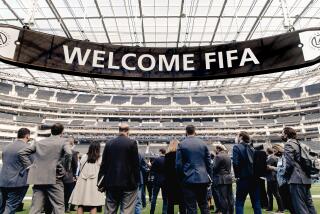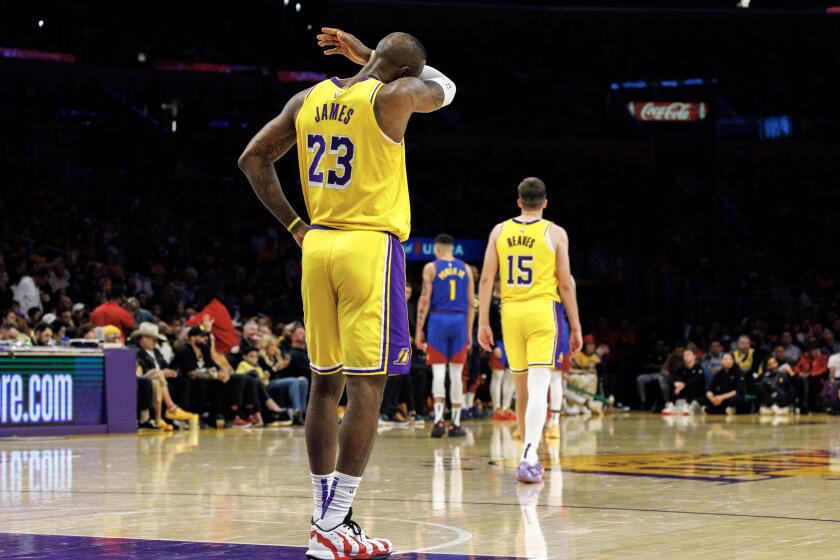Brazil takes stock after World Cup comes to an end
RIO DE JANEIRO -- As the last of the World Cup visitors headed for the airports Monday, Brazilians began to reclaim the pristine beaches of Copacabana and Ipanema while traffic in Sao Paulo returned to its regular weekday snarl and the seaside hotels in Salvador, Recife and Natal emptied.
After seven years of planning and 31 days of competition, the most expensive soccer tournament in history is over. And the dire predictions that street demonstrations, massive transportation breakdowns and construction delays would disrupt the event proved unfounded, with Brazil’s tournament ranking among the most successful in World Cup history.
“We’ve eliminated the doubts of all who didn’t believe in us,” President Dilma Rousseff told a gathering of foreign journalists.
Many Brazilians have done an about face as well. Once ambivalent about the event, they’re now sad to see it go.
“I think it was probably good for us, in the sense that it brought tourists, and at least people got to see a side of Brazil that wasn’t just samba and half-naked women,” said Deborah Lopes, a 28-year-old lawyer from Rio de Janeiro. “I got to meet so many foreigners. That was really cool.”
By the time the final accounting is done, the bill for this World Cup is likely to exceed $14 billion, more than three times what it cost to put on the 2010 tournament in South Africa. But attendance was higher as well, topping 3.4 million, the second-highest figure in tournament history.
This World Cup was also more ambitious than most. Games were played in 12 cities spread across the continent-sized country, from the heat and humidity of the Amazon rain forest to the cool of Porto Alegre, in the southernmost state of Rio Grande do Sul. And the 700,000 visitors that flooded the country in June swelled the number of passengers passing through Brazil’s 21 airports to nearly half a million per day, said Luis Fernandes, Brazil’s deputy sports minister.
Yet, the airports absorbed the load and most flights ran on time.
“This is a big legacy,” said Ricardo Trade, chief executive of the organizing committee. “As Brazilians, we can now say we can use all this for the future.”
And finally the political protests that drew more than a million people into the streets of Rio de Janeiro during last summer’s Confederation Cups did not return despite strikes and work stoppages that continued until the eve of the tournament.
Sepp Blatter, president of FIFA, soccer’s governing body and organizer of the World Cup, said expectations inside and outside Brazil began to change with the first game.
“My first big impression was the opening match,” he said. “I said when the kickoff of the World Cup would be done, something would change in this country. And this has been real.”
Brazil’s World Cup also featured a record-tying 171 goals, eight overtime games, including the final, and four that were decided by penalty kicks. But even that level of drama and excitement couldn’t erase all the problems.
Although Brazilians eventually warmed to the event, cost overruns and suspected corruption added billions to the costs, money that many argued would have been better spent on education or health care. And 10 people died during World Cup-related construction projects.
“Of course, the stadiums were too expensive and many people used the Cup to get rich, stealing from the people,” Lopes said. “Corruption in Brazil is real. That existed before the stadiums were built and unfortunately it will continue to exist now that the Cup is over.”
Rafael de Souza Campos, who works at a Rio de Janeiro coffee bar, is optimistic the good will outweigh the bad.
“It was good for business here and it was a fantastic spectacle,” he said. “Such a big investment will always mean some costs and damages and some profits. I’m hoping that in the long term the profits outweigh the costs. It was very expensive, that’s a fact. I just hope it was worth it.”
For many Brazilians that left only one huge downside to the tournament: their team, favored to win the World Cup, didn’t get past the semifinals.
“It’s sad that it ended the way it did,” said Maria da Gloria Oriole, at 99 one of the few Brazilians who can remember the last World Cup held in the country, in 1950. Brazil didn’t win that one either.
“The whole thing was a shame,” she said. “It was a beautiful thing that people came here from around the world and everyone got along.
“But I’m relieved that it’s over and we can go back to our lives in peace.”
More to Read
Get our high school sports newsletter
Prep Rally is devoted to the SoCal high school sports experience, bringing you scores, stories and a behind-the-scenes look at what makes prep sports so popular.
You may occasionally receive promotional content from the Los Angeles Times.







